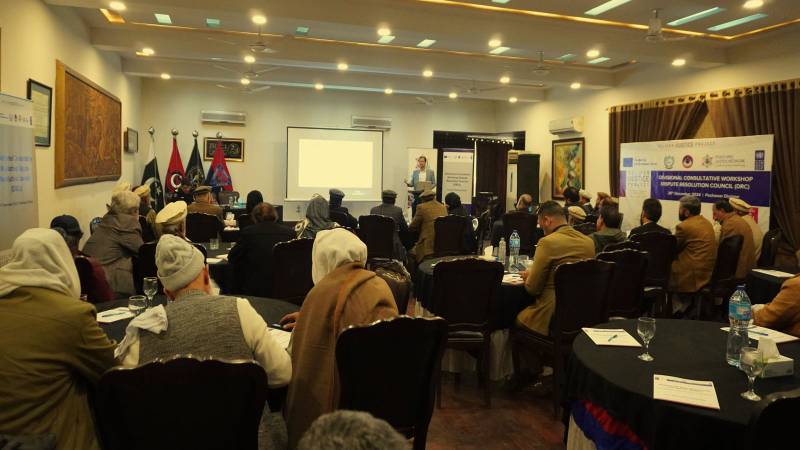
The Peace & Justice Network (PJN), in partnership with UNDP Pakistan and the Khyber Pakhtunkhwa Police, organized a divisional consultative workshop in Peshawar to develop an action plan for strengthening Dispute Resolution Councils (DRCs) in Khyber Pakhtunkhwa.
Held under the EU-funded Deliver Justice Project, the workshop brought together stakeholders from across the region, including DRC members from Peshawar and Khyber, judiciary representatives, law enforcement, civil society, legal experts, and community leaders, to strategize on enhancing the capacity and effectiveness of DRCs.
The workshop aimed to address challenges faced by DRCs and create a comprehensive action plan for empowering these councils as key mechanisms for resolving disputes and ensuring access to justice. Syed Raza Ali, CEO of the Peace & Justice Network, emphasized, “Strengthening DRCs is critical for ensuring that justice is accessible, efficient, and inclusive, particularly for marginalized groups. DRCs have the potential to bring justice closer to the people, reducing the burden on formal courts and fostering trust within communities.”
SSP Coordination Peshawar, Muhammad Waqas Khan, remarked, “As alternative dispute resolution (ADR) mechanisms, DRCs are instrumental in reducing conflicts at the community level. Strengthening their operational capacity is essential to maintaining social harmony and addressing disputes efficiently.”
Salma Zeb, Rule of Law Specialist at UNDP Pakistan, highlighted the importance of inclusivity, stating, “For DRCs to be truly effective, they must represent and address the needs of all community members, including women, minorities, and other vulnerable groups. Inclusivity is at the heart of sustainable justice and peace.” She also emphasized UNDP Pakistan's unwavering commitment to strengthening the rule of law in Khyber Pakhtunkhwa.
Nayyab Ali, Transgender Rights Advocate and Incharge of the Islamabad Police Gender Cell, added, “DRCs must actively engage marginalized groups, including transgender individuals, to build trust and ensure equitable access to justice. Their participation strengthens the inclusivity and legitimacy of the justice process.”
Nida Khan, Advocate and Rule of Law Advisor at PJN, underscored the need for gender responsiveness in DRCs, noting, “A gender-sensitive approach in dispute resolution ensures that the voices of women and girls are heard and their grievances addressed. This is vital for creating a more equitable and just society.”
Wajid Ali Khan, Director of Regulation and Additional District & Sessions Judge, stated, “DRCs play a pivotal role in bridging the gap between communities and formal justice institutions. By improving their procedural frameworks and providing adequate resources, we can ensure their sustainability and effectiveness.”
CCPO Peshawar, Qasim Ali Khan, commended the tireless efforts of DRC members, stating that the DRC is a highly transparent and active institution dedicated to delivering justice and addressing the everyday challenges faced by the community. These include family disputes, property issues, transactional conflicts, and other minor disagreements. He emphasized the critical role DRCs play in resolving such matters to prevent escalation into larger conflicts or significant losses.
He further noted that DRCs, as a legally supported alternative dispute resolution mechanism, have successfully formalized and enhanced the traditional Jirga system, which has significantly helped in mitigating community problems and conflicts. “Being part of the society, you understand the challenges people face and are best positioned to resolve them. There are high expectations from you, as your efforts have led to a notable reduction in issues. Small disputes often lead to bigger crimes, so addressing them promptly is crucial,” he added.
Participants delved into the socio-cultural dynamics of Peshawar Division, discussing barriers such as procedural complexities, limited resources, and public awareness. Recommendations included strengthening legal and procedural frameworks governing DRCs, enhancing inclusivity by increasing the participation of women, transgender individuals, religious minorities, and persons with disabilities, improving coordination between DRCs and formal justice institutions for seamless collaboration, as well as providing technical and operational training to DRC members.
The workshop concluded with CCPO Peshawar, Qasim Ali Khan, extending his gratitude to UNDP, PJN, and all DRC members for their invaluable contributions. He acknowledged their efforts in fostering justice and harmony and ensuring equitable access to dispute resolution. The CCPO reaffirmed the Khyber Pakhtunkhwa Police’s strong commitment to strengthening DRCs, enhancing their capacity, and supporting their role as effective mechanisms for resolving disputes.

